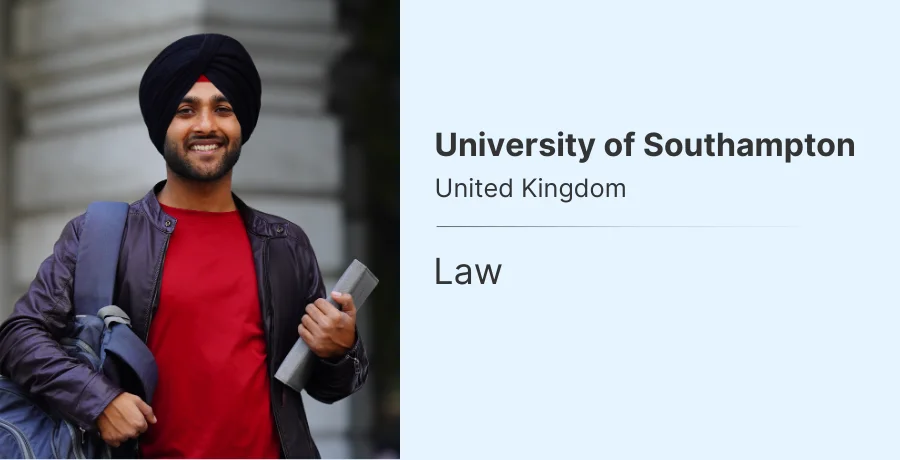University of Law
University – Highlights
The University of Law, established in 1962, has a distinguished reputation for providing top-notch legal education. With a QS ranking that underscores its excellence, the university has secured its position among the premier law schools globally. The university boasts state-of-the-art infrastructure, ensuring students have access to the best resources and facilities. The teaching faculty comprises seasoned experts and experienced professionals, many of whom are leading figures in the legal field. The university is well-funded, enabling it to offer a range of scholarships and financial aids. Furthermore, it holds several accreditations, making its degrees highly recognized and respected worldwide.
- Year of establishment: 1962
- QS Ranking: Top 100
- Other Rankings:
- Ranked 1st in student satisfaction
- Top 50 globally for employability
- Top 10 in Europe for law
- Top 20 in UK for research output
- Infrastructure: Modern facilities with cutting-edge technology
- Teaching Faculty: Experienced professionals and experts in the field
- Funding: Well-funded with numerous scholarships available
- Accreditation: Multiple accreditations ensuring global recognition
University - Admissions
The University of Law welcomes students from all over the world, with a significant percentage of international students enriching the campus diversity. Admissions are open for multiple intakes throughout the year, typically in the fall and spring semesters. The university’s infrastructure supports a conducive learning environment, equipped with modern amenities and resources.
UG Admissions
- High school diploma or equivalent
- Minimum GPA of 3.0 on a 4.0 scale
- English proficiency test scores (IELTS/TOEFL)
- Personal statement outlining career goals and motivations
- Letters of recommendation from teachers or mentors
PG Admissions
- Bachelor’s degree in relevant field
- Minimum GPA of 3.0 on a 4.0 scale
- English proficiency test scores (IELTS/TOEFL)
- Statement of purpose outlining research interests
- Letters of recommendation from academic or professional referees
Ph.D. Admissions
- Master’s degree in relevant field
- Minimum GPA of 3.5 on a 4.0 scale
- Research proposal outlining intended study
- English proficiency test scores (IELTS/TOEFL)
- Letters of recommendation from academic referees
To know more about other universities in the UK, click here.
Eligibility Criteria
UG Programs
- Law (LLB)
- Criminology
- Business Law
- International Law
- Legal Practice
PG Programs
- Master of Laws (LLM)
- Legal Practice Course (LPC)
- Bar Professional Training Course (BPTC)
- International Business Law
- Corporate Law
University Programs
The University of Law offers a variety of undergraduate, postgraduate, and doctoral programs, designed to cater to the diverse needs and interests of its students. The programs are structured to provide a comprehensive understanding of the legal field, preparing students for successful careers.
UG Programs
- Law (LLB) - A comprehensive program covering all aspects of law.
- Criminology - Focuses on criminal justice and the criminal legal system.
- Business Law - Combines legal studies with business principles.
- International Law - Deals with legal issues on a global scale.
- Legal Practice - Practical training for aspiring legal practitioners.
PG Programs
- Master of Laws (LLM) - Advanced legal studies in various specializations.
- Legal Practice Course (LPC) - Practical training for future solicitors.
- Bar Professional Training Course (BPTC) - Preparation for becoming a barrister.
- International Business Law - Focuses on legal aspects of international business.
- Corporate Law - Specializes in legal issues related to corporations.
Accommodation
On-campus accommodation
The University of Law provides comfortable on-campus accommodation, equipped with all necessary amenities to ensure a conducive living and learning environment for students.
Off-campus accommodation
Students can also opt for off-campus accommodation, which includes a range of housing options near the university, providing flexibility and convenience.
Housing options
Various housing options are available, including shared apartments and individual rooms.
Cost of Tuition Fees
The cost of tuition fees at the University of Law is competitive, with various funding options available to support students financially. Below are the approximate figures:
| Program | Approximate Fees |
|---|---|
| Undergraduate | £12,000 - £15,000 per year |
| Postgraduate | £15,000 - £18,000 per year |
Cost of Living
The cost of living for students at the University of Law is as follows:
| Category | Approximate Cost |
|---|---|
| Rent, travel, utilities | £600 - £800 per month |
| Food & Drink, entertainment | £200 - £300 per month |
Scholarships
The University of Law offers various scholarships to support students financially. Below is a list of the top 10 scholarships available:
| Scholarship | Maximum Amount |
|---|---|
| Merit-based Scholarship | £5,000 |
| Need-based Scholarship | £4,000 |
| International Student Scholarship | £6,000 |
| Excellence in Law Scholarship | £7,000 |
| Women in Law Scholarship | £5,000 |
| Diversity Scholarship | £4,500 |
| Leadership Scholarship | £3,500 |
| Research Scholarship | £6,500 |
| Alumni Scholarship | £2,500 |
| Community Service Scholarship | £4,000 |
To know about the UK study visa requirements, click here.
Placements
The University of Law has an impressive placement rate, with graduates securing positions in top law firms and organizations. The university’s career services provide extensive support to students, ensuring they are well-prepared for the job market.
Placement Rate: 90%
| Job Role | Approximate Salary |
|---|---|
| Solicitor | £40,000 - £70,000 |
| Barrister | £50,000 - £100,000 |
| Legal Consultant | £45,000 - £80,000 |
| Corporate Lawyer | £60,000 - £90,000 |
| Compliance Officer | £35,000 - £65,000 |
| Legal Advisor | £40,000 - £75,000 |












